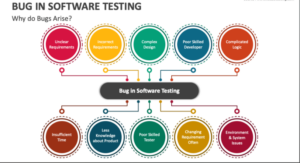In today’s fast-paced digital world, software development teams face increasing pressure to deliver high-quality products in shorter timeframes. A critical factor in achieving this goal is Quality Assurance (QA). QA plays an essential role in ensuring that the software meets the required standards, is functional, and is free of bugs before being released to users. But what exactly is QA, and why should you consider learning a QA program? In this blog, we’ll dive into the significance of QA, its role in software development, and how Software quality assurance training can be your gateway to an exciting IT career.
Why is Quality Assurance Important in Software Development?
In software development, quality is paramount. A poorly tested application can lead to frustrated users, data breaches, or even costly recalls. To highlight the importance of QA, consider these statistics:
- 70% of users say they abandon apps because of poor performance (Source: Apptentive).
- 60% of software projects fail to meet their objectives due to poor testing and quality assurance practices (Source: Software Testing Help).
These figures show the high stakes in delivering quality software. The need for QA becomes even more evident in industries like banking, healthcare, and e-commerce, where software failure can lead to legal issues, financial loss, and damage to reputation.
Key Functions of Quality Assurance
Understanding the functions of QA can help you see its value in the software development lifecycle. Some of the main responsibilities of QA include:
Defining Quality Standards
QA teams are responsible for defining what “quality” means for a specific project. This involves setting up clear guidelines, such as performance metrics, security standards, usability features, and more.
Test Planning
Once quality standards are defined, QA teams create test plans to ensure that all aspects of the software are tested rigorously. This can include:
- Unit testing: Testing individual components or functions of the software.
- Integration testing: Ensuring that different software components work together seamlessly.
- System testing: Verifying that the entire software system works as intended.
Test Execution
During the development phase, QA teams perform tests to identify any bugs or issues. These tests are carried out in controlled environments that replicate real-world conditions as closely as possible.
Bug Reporting and Documentation
When issues are identified, QA teams document and report them to the development team. This allows for quick fixes and ensures that the final product is free of major defects.
Continuous Improvement
QA isn’t a one-time process but an ongoing commitment. With each iteration or release, QA teams gather feedback, analyze failures, and recommend process improvements to enhance future versions of the software.
Why Should You Learn a QA Program?
Now that we’ve discussed the importance of QA, let’s address the question of why you should consider enrolling in a QA IT training program. Whether you’re a fresh graduate or a professional looking to switch careers, learning QA offers several compelling benefits.
High Demand for QA Professionals
The tech industry is booming, and there’s a high demand for software quality assurance professionals. As businesses continue to rely on software for almost every operation, ensuring the quality of that software becomes more critical. This growing need for QA experts means there are plenty of career opportunities for individuals with the right skills.
In fact, according to the U.S. Bureau of Labor Statistics, the job market for software developers and testers is expected to grow by 22% from 2020 to 2030, much faster than the average for other professions.
Increased Job Security
In a competitive job market, having specialized skills can provide a strong advantage. QA professionals are integral to any software development team, ensuring that products are delivered on time and meet quality standards. As long as companies continue to develop software, QA roles will remain essential.
Diverse Career Opportunities
QA professionals can explore various career paths, such as:
- Manual Testing: Involves testing software manually to identify defects.
- Automation Testing: Uses automated tools to speed up the testing process.
- Performance Testing: Focuses on testing the performance and scalability of software under load.
- Security Testing: Ensures that the software is secure from external threats.
Learning QA opens doors to these specialized roles, each offering competitive salaries and career growth opportunities.
Skill Development
A comprehensive QA training program provides you with valuable, hands-on skills that are in high demand. These include:
- Testing methodologies (e.g., Agile, Scrum, Waterfall)
- Automated testing tools like Selenium, JUnit, and LoadRunner
- Bug tracking tools like Jira, Bugzilla, and TestRail
- Programming languages such as Python, Java, or Ruby
- Problem-solving and critical thinking skills to identify and resolve software defects
These skills will not only make you an attractive candidate to employers but will also help you in your current job or projects by improving software quality.
Competitive Salaries
Quality Assurance professionals are well-compensated for their expertise. According to Glassdoor, the average salary for a QA Engineer in the U.S. is around $80,000 per year, with more experienced professionals earning upwards of $100,000 annually.
In addition, professionals who specialize in automation or performance testing often command even higher salaries due to the technical expertise required for these roles.
What Will You Learn in a QA Training Program?
A comprehensive Software Quality Assurance training program should equip you with both the theoretical knowledge and practical skills to succeed in QA roles. Here are some key topics you can expect to learn in such a program:
Introduction to Software Testing
You’ll begin with the basics of software testing, including different types of testing, the SDLC (Software Development Life Cycle), and the QA role within the development process.
Manual Testing Techniques
Manual testing teaches you how to test applications manually by simulating real user behavior. You’ll learn how to create test cases, execute them, and document the results.
Automation Testing
In today’s fast-paced environment, automation is a must-have skill. You’ll learn how to use automation tools like Selenium and QTP to automate repetitive test cases, saving time and improving test coverage.
Test Management Tools
Learn how to use tools like Jira, TestRail, and Bugzilla for test case management, defect tracking, and reporting. These tools help keep teams organized and ensure that defects are addressed quickly.
Performance and Security Testing
Get hands-on experience in testing software performance (load testing, stress testing) and ensuring that applications are secure from potential threats.
Agile and DevOps Testing
Modern software development processes like Agile and DevOps require testers to collaborate closely with developers. QA training will teach you how to test within these frameworks and ensure continuous integration and delivery.
Soft Skills and Communication
QA is not just about testing but also about communicating defects and issues effectively with the development team. You’ll learn how to write clear bug reports, collaborate in team meetings, and ensure that quality is maintained throughout the development lifecycle.
Hands-On Learning at H2K Infosys
At H2K Infosys offer top-notch QA IT training that equips you with real-world skills through hands-on learning. Our curriculum includes live projects, interactive sessions, and access to experienced mentors who can guide you through every aspect of QA. We ensure that you not only understand the theoretical aspects of software quality assurance but also gain practical experience working with tools and technologies that are essential in the industry.
Whether you’re looking to become a manual tester, an automation specialist, or a performance tester, H2K Infosys provides the training you need to launch or advance your QA career.
Conclusion:
Quality Assurance is an indispensable part of the software development process, ensuring that end-users get the best possible product. With the right training, you can develop the skills necessary to become a sought-after QA professional in today’s booming tech industry.
Ready to enhance your career with quality assurance skills? Enroll in H2K Infosys’ QA training programs to gain hands-on experience and advance your IT career.
Key Takeaways:
- QA is essential for delivering high-quality software and ensuring user satisfaction.
- Learning QA opens doors to diverse and well-compensated career opportunities.
- Comprehensive QA IT training provides the skills needed to succeed in various testing roles.
- H2K Infosys offers practical, real-world QA training to help you build a successful career in software quality assurance.






























One Response